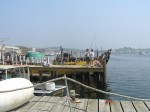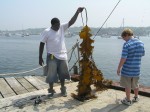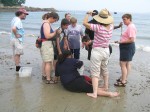It was a busy summer for several Plum Island Ecosystem (PIE) LTER scientists who, in addition to their regular research duties, added teaching responsibilities to their schedules.
Their action has helped local teachers and students better under- stand PIE-LTER science and, in turn, helped the scientists better understand teachers and students. These groups were brought together thanks to the efforts of PIE-LTER education representative, Liz Duff, who is also education coordinator for Mass Audubon's Salt Marsh Science Project. Duff has been engaging Middle and High School teachers and students in long-term research of the invasive reed Phragmites.
As PIE-LTER education representative, Duff has been working toward making PIE-LTER science more accessible to teachers, students, and the wider public. This effort has taken some creativity, since most PIE research sites are fragile and barely accessible.
Three events last spring and summer supported the goal of bringing teachers and scientists together. The first event involved teachers in the PIE-LTER All Scientists Meeting in May. Ten teachers attended the presentations by LTER scientists, and brainstormed with them the various ways of incorporating research into the Massachusetts curricula. Many of the best connections and conversation happened informally during the dinner and social events after the presentations. During this time educators could follow up on the scientific presentations with one-on-one questions.
In summer, the Gulf of Maine Institute (GOMI) brought together over 50 participants including scientists, researchers, youth, community members, and educators in a bid to move participants from awareness to understanding and, ultimately, action about the controversy surrounding striped bass fishing in nearby costal waters. Funded in part by New England Center for Ocean Sciences Education Excellence (NE-COSEE), the four-day summer institute included scientists for the first time and was dubbed “Ocean Science Education Institute” (OSEI). PIE-LTER researchers Martha Mather, Jack Finn, Sarah Pautzke, and Bob Muth from the Department of Natural Resources Conservation at the University of Massachusetts–Amherst, explained to students and teachers the habits of striped bass, how to fish for them, and the political controversies surrounding the fish. Participants learned to seine, cast fishing rods, interview fisherman, and present their findings to a wider group. Additionally, PIE-LTER researcher James Morris demonstrated how he studied responses of coastal wetlands to rising sea level using a multi-tiered structure called a “marsh organ.” The salt marsh theme team assisted Morris in building a new marsh organ that will likely be located at a public viewing area, the Mass Audubon’s Joppa Flats.
While the GOMI event reached 50 participants, we intend to have a much greater impact. To bring PIE-LTER research closer to the public eye, we plan to make available video footage and photographs from the event via cable access television and displays at local nature centers.
Video footage and photographs taken during a second event, a graduate level course for High School teachers titled Climate Change and Coastal Communities, will similarly be carried on cable access television and exhibited at local nature centers. This course also was organized by PIE-LTER researchers, who gave presentations, led lab activities, introduced teachers to working with PIE-LTER data, and led them on a kayak tour of PIE-LTER research sites. Many teachers said the tour was the highlight of the course for them. It was clear that they had bonded with and learned a great deal about the Great Marsh and the Rowley River, judging by their reluctance to leave. Besides learning about local research, the class attended a talk by a senior scientist, Dr. Bruce Peterson, about his research in the Arctic. Titled “Global Warming and the Acceleration of the Arctic Freshwater Cycle,” Peterson expressed his appreciation for the opportunity to get the message out about global warming. In turn the teachers requested copies of his presentation to share with their students.
Through the three summer events we were able to connect teachers, students, and scientists in a productive, informative, and educational manner, providing valuable experiences for all involved. We look forward to being able to maintain the connectivity between education and science in the future of the PIE-LTER.

 Enlarge this image
Enlarge this image

